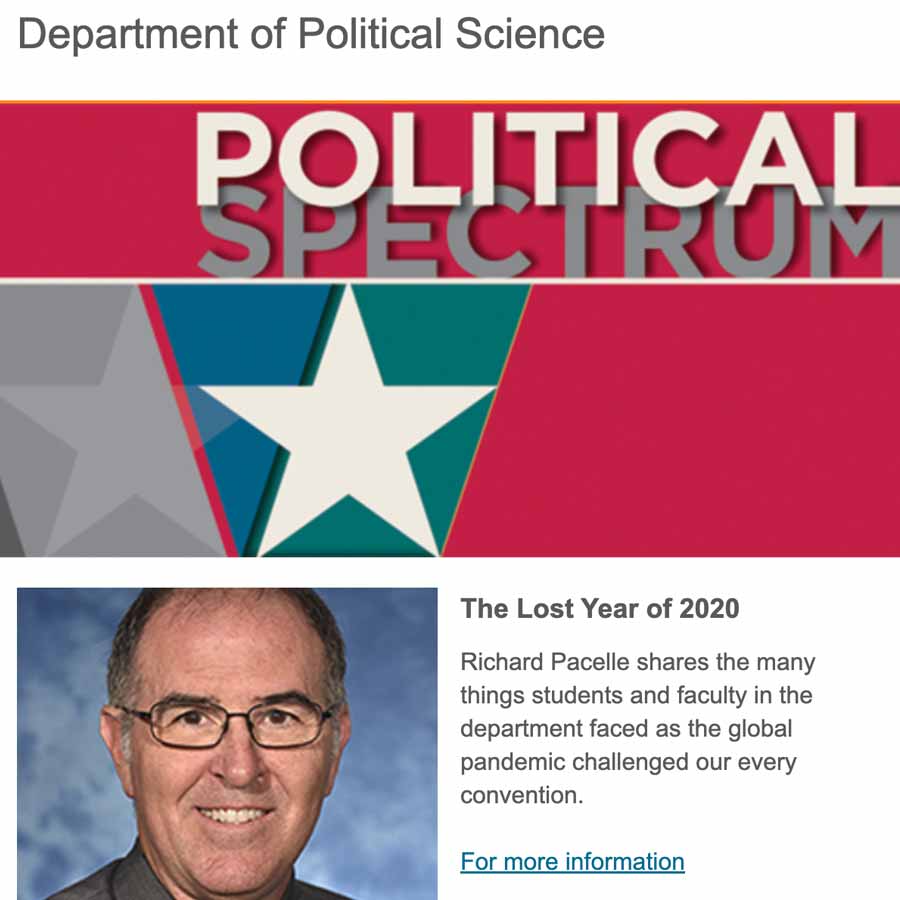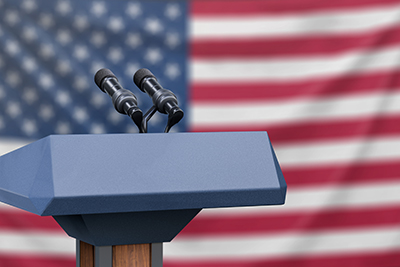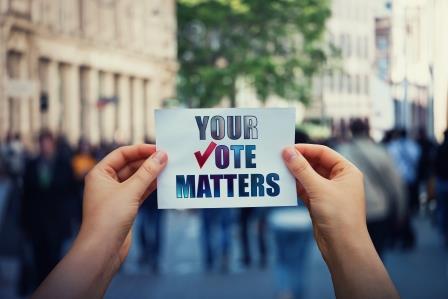Fall 2021 Newsletter

The Imperfect Vision of 2020

The year 2020 should have been a great year for the department. A presidential election would fuel student interest. The numbers of majors and enrollment were the highest in years. The department welcomed four new faculty members. A number of faculty members published books and articles extending the footprint of the department both nationally and internationally. The department continues to climb the national rankings.
Currently, faculty are editing three major journals in our field. Professors Krista Wiegand and Brandon Prins are editing International Studies Quarterly, arguably the top journal in the area. One of our new faculty, Professor Michael Jones, edits the top journal in his field, Policy Studies Journal. Professor Matthew Buehler is an editor of Mediterranean Politics, an important journal in the subfield. Technically, there is a fourth, multidisciplinary journal, Latin American Research Review, and Professor Jana Morgan serves as associate editor for politics and international relations and is responsible for that part of the journal. Thus, the department helps to set the agenda for current and future research
Our undergraduate students continue to distinguish themselves and a number graduated to top law schools and graduate programs. They did not have the graduation they had envisioned and we did not have the ability to honor them publically or our graduate students who finished the requirements for the MPPA or PhD. Our 2020 spring and fall semesters were interrupted and we had to reconfigure the college experience for (hopefully) the short-term.
In this edition of our newsletters, we profile two undergraduate students: Isabelle Marshall and Katherine Fulcher. Students like these two are a real challenge. As their instructors, it is hard to stay ahead of them. But the real challenge is writing a letter of recommendation for them. How do you find the appropriate superlatives? How do you convince the admissions officers or the human relations representatives that the letter they are reading are not hyperbole? How do you convey the depth and quality of these candidates? How do you keep the letter under five pages single-spaced with a small font? We are proud of our many talented, high achieving students.
COVID-19 Pandemic and the Lost Year of 2020
Perhaps we should have known. The year 2020 opened for the discipline of political science and the department in San Juan, Puerto Rico, where the Southern Political Science Association (SPSA) held its annual meeting. Just a few days before the conference, the island, already trying to recover, was hit with an earthquake. The SPSA decided to hold the conference. A number of political science professors from across the globe opted out and decided not to attend. Members of the UT Department of Political Science who were presenting papers, chairing panels, discussing research, and fulfilling administrative duties embarked for San Juan. Once we were there, we shook through three other earthquakes/aftershocks.
Our other main conferences did not fare better. The Midwest Political Science Association in April was cancelled in deference to the first surges of the coronavirus. The American Political Science Association, the major national organization, cancelled its meetings scheduled for San Francisco in September due to the wildfires in California.
Let’s be clear up front – the global pandemic has been the most devastating scourge in our lifetimes. As of early November, more than 250,000 Americans have died due to the virus. And the virus is surging again.
We witnessed racism rear its ugly head. The Black Lives Matter movement picked up momentum and made a dent in public opinion. Despite the pandemic, people took to the streets to protest.
The Olympics were postponed and college and professional sports were put on a hiatus. We learned about the “bubble.”

The 2020 presidential election was unlike any previous election. Neither party held conventions with funny hats and balloons. Rather they became virtual (like so much else). Candidates did not campaign in traditional ways until near the end of the general election. Turnout reached record levels. And in the end, both sides claimed victory.
All of the faculty and graduate students know someone who has tested positive or had the symptoms of this deadly virus. Some of our students contacted the virus. All of you know how it has affected you personally: your social life, your education, your job, your familial responsibilities, your entire life has been altered. That said, most of us have been relatively lucky. We have our health and we have jobs or school. Some colleges have had faculty and staff placed on furloughs or were forced to eliminate positions and in a few cases, whole departments. Elementary and secondary schools closed their doors and went to virtual classrooms or online education. Children had to be told they could not play with their friends who lived a matter of 20 yards away. Most of the faculty and graduate students come from other places. The pandemic has limited their ability to see their parents and grandparents or their grown children. Two of our graduate students had a virtual wedding with family and friends sharing their best wishes via Zoom.
In this newsletter, we want to examine how the new abnormal of 2020 affected our faculty and students. Some faculty and graduate students are busy studying the political effects of the coronavirus. Here is a snapshot of life against this backdrop.
Faculty and graduate students had their research interrupted. For many faculty, their research is dependent on travel, interviews, and archives and that was limited. Study abroad programs in London and Florence were cancelled. Classes went all online for the spring and summer semesters, and the fall semester is a patchwork of face-to-face, online, and the wide ranging so-called hybrid classes. The campus often looked like a ghost town.
Our student groups – Model United Nations, Speech and Debate Team, Mock Trial, and TISL – either had to go to virtual or intramural competitions or they were just canceled. Students took internships in Washington and Nashville only to have them shortened due to the health concerns.
The pandemic brought local businesses to their knees. Nationally, one of every six restaurants have closed. We all learned Zoom. Of course, this pandemic affected every school and every student down to pre-school. As Professor Krista Wiegand noted in this article, the effects were not equally spread out.
The Mother of Invention
They say “necessity is the mother of invention” (singular, we are not talking about Frank Zappa here). Some argue that Plato, the first political theorist, appears to be the first to express the sentiment, less eloquently: “Our need will be the real creator.” They also say, “when life gives you lemons, make lemonade.” At spring break, we sent the students home. In August, we welcomed them back.
The pandemic challenged our conventions. The university, corresponding with other institutions of higher education created new vehicles and protocols. Many classes went totally online. Others remained face-to-face (f2f in the vernacular), but rooms that sat 40 were limited to 20 students. And in between, there were all matter of hybrid classes. Some combined face-to-face with online. In some sections, half the class would attend one day while their classmates stayed at home and participated via Zoom. Next meeting, the roles would reverse.
We did not want to water down the content of the instruction. We did want to provide a collegiate environment. And we wanted to make sure that everyone, students and instructors, remained healthy.
The pandemic is a major public health crisis and dealing with it is a political issue. Faculty came up with their own unique ways of meeting the challenges and making lemonade. It provided faculty members with teaching moments. We offer numerous classes on public policy and that was a natural venue to discuss public health policies. Classes on American politics, including those on institutions and voting behavior examined the influence of the pandemic on the conduct and outcome of the election. Professor Zhong discussed the government response to the virus in China. Professor Hwang covered the impact of COVID-19 on the world economy and politics in his international political economy class. Professor Solomon-Schwartz typically assigns her students in comparative politics two nations to study throughout the semester. She built in a module for the effects of the coronavirus on each of their nations. In our law-related classes, we discussed whether government could force individuals to wear masks and the balance between the intrusion on individual rights and the government’s attempts to manage a health crisis. Could the government “close” the churches or did that violate the free exercise of religion?
Public administration courses dealt with state and local governmental responses to the pandemic and the economic fallout. No class was as relevant as Professor Joe Jarret’s course on risk management. Our MPPA students are required to take an economics course and that class examined tax revenues and the assault of the pandemic on budgeting in the state. Students taking constitutional law and public administration spent time considering America’s brand of federalism and how it was influencing the battle to get the virus under control.
Two of our recent PhD graduates offer their perspectives as a city manager and the head of an agency that helps local governments across the state.
We all learned how to Zoom (and Zoomed became a verb). Faculty brought their students outside and conducted class in the fresh air, practicing safe learning distance. Simulations, movies, virtual trips, and visits became the order of the day. Professor Ojeda had visitors from around the country come to his class via Zoom.
The Annual Softball Game
Alas, the annual softball game between the graduate students and faculty was a casualty of the COVID-19 pandemic as well. We provided statistics and asked the experts from 538.com and the Economist to run simulations based on the batting averages, slugging percentages, ERA, and WAR. They each ran 40,000 simulations before the pandemic.
In 38,217 of those simulations resulted in a faculty win by more than 10 runs. In 1,749 simulations, the faculty won by less than 10 runs. Thirty-one of the 40,000 simulations showed repeated rainouts that forced cancellation. One simulation had an 8-8 tie and one had the graduate students winning. One simulation showed the game cancelled by a global pandemic.